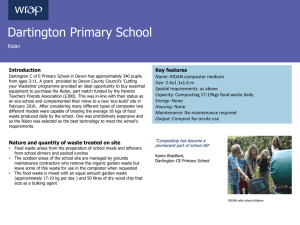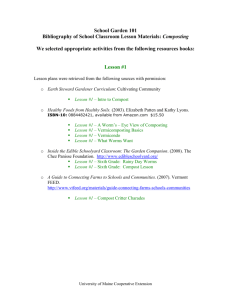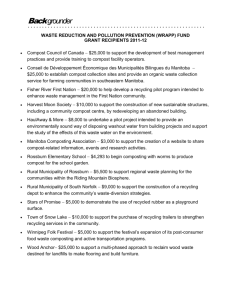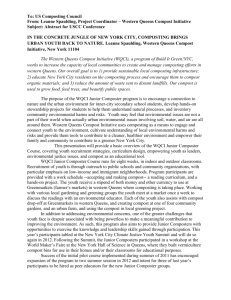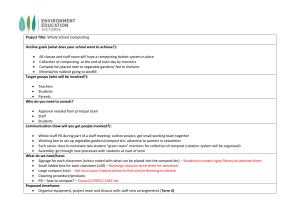Read more.. - Ridan Food Waste Composters
advertisement
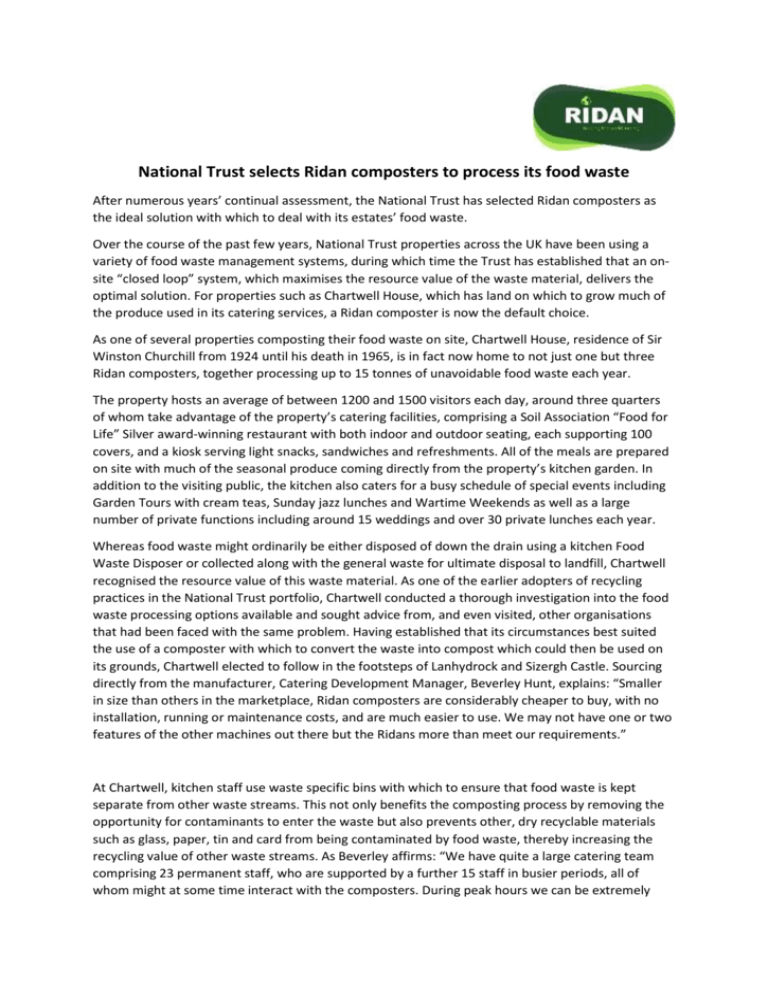
National Trust selects Ridan composters to process its food waste After numerous years’ continual assessment, the National Trust has selected Ridan composters as the ideal solution with which to deal with its estates’ food waste. Over the course of the past few years, National Trust properties across the UK have been using a variety of food waste management systems, during which time the Trust has established that an onsite “closed loop” system, which maximises the resource value of the waste material, delivers the optimal solution. For properties such as Chartwell House, which has land on which to grow much of the produce used in its catering services, a Ridan composter is now the default choice. As one of several properties composting their food waste on site, Chartwell House, residence of Sir Winston Churchill from 1924 until his death in 1965, is in fact now home to not just one but three Ridan composters, together processing up to 15 tonnes of unavoidable food waste each year. The property hosts an average of between 1200 and 1500 visitors each day, around three quarters of whom take advantage of the property’s catering facilities, comprising a Soil Association “Food for Life” Silver award-winning restaurant with both indoor and outdoor seating, each supporting 100 covers, and a kiosk serving light snacks, sandwiches and refreshments. All of the meals are prepared on site with much of the seasonal produce coming directly from the property’s kitchen garden. In addition to the visiting public, the kitchen also caters for a busy schedule of special events including Garden Tours with cream teas, Sunday jazz lunches and Wartime Weekends as well as a large number of private functions including around 15 weddings and over 30 private lunches each year. Whereas food waste might ordinarily be either disposed of down the drain using a kitchen Food Waste Disposer or collected along with the general waste for ultimate disposal to landfill, Chartwell recognised the resource value of this waste material. As one of the earlier adopters of recycling practices in the National Trust portfolio, Chartwell conducted a thorough investigation into the food waste processing options available and sought advice from, and even visited, other organisations that had been faced with the same problem. Having established that its circumstances best suited the use of a composter with which to convert the waste into compost which could then be used on its grounds, Chartwell elected to follow in the footsteps of Lanhydrock and Sizergh Castle. Sourcing directly from the manufacturer, Catering Development Manager, Beverley Hunt, explains: “Smaller in size than others in the marketplace, Ridan composters are considerably cheaper to buy, with no installation, running or maintenance costs, and are much easier to use. We may not have one or two features of the other machines out there but the Ridans more than meet our requirements.” At Chartwell, kitchen staff use waste specific bins with which to ensure that food waste is kept separate from other waste streams. This not only benefits the composting process by removing the opportunity for contaminants to enter the waste but also prevents other, dry recyclable materials such as glass, paper, tin and card from being contaminated by food waste, thereby increasing the recycling value of other waste streams. As Beverley affirms: “We have quite a large catering team comprising 23 permanent staff, who are supported by a further 15 staff in busier periods, all of whom might at some time interact with the composters. During peak hours we can be extremely busy so it has been crucial to maintaining, and in fact further improving, our efficiency levels that we have been able to integrate the composting solution seamlessly into our operation. Kitchen staff generally empty the contents of the 3 or 4 food waste collection bins, together with a relatively small amount of carbon-rich wood pellets, once a day into one of the composters on a rotational basis in order that all 3 units are running pretty much in tandem with one another. We even store the output compost material in maturation boxes which our gardeners are able to draw from wherever required. All of the compost is used in the kitchen garden to grow produce which we use in our menu so this is a truly closed-loop system.” Unlike many other establishments, at Chartwell the responsibility for managing the composting process lies with the catering, rather than the grounds or estate, staff. “We received training from Ridan when the composter was installed,” continues Beverley, “but it really is so simple to stay on top of the biological process and to keep them performing perfectly.” The quality of the compost has also endeared the Ridans to the gardening team with Head Gardener, Giles Palmer, impressed at the quality of the compost: “Contrary to any initial doubt I may have had before the introduction of the composters, I have found the quality of the compost to be absolutely fantastic; in fact, by blending it with our garden compost, it seems to accelerate the speed with which the green waste breaks down.” Rather than hide the composters away from the public gaze, concerned that the waste treatment process might be visually offensive, Chartwell has instead chosen to outwardly promote them to the visiting public and has produced signage and information boards in the kitchen garden which explain the natural process the waste goes through. As Beverley asserts: “We want to share our commitment to reducing our demands on the planet’s dwindling natural resources in the belief that we will help people better understand the impact we are having on our environment and encourage them to adopt eco-friendly practices themselves. We even place “Food for Thought” information sheets on our tea trays to help increase public awareness and inspire people to consider how they can reduce their carbon footprint.” Beverley acknowledges that the composters bring multiple benefits on a number of commercial, operational and environmental levels. “Not only have we been able to save money by eradicating our food waste disposal costs and producing our own compost but, through the recycling of our waste into a valuable resource, we are also both protecting our environment and enhancing the property’s green credentials. On a practical level, we have been able to reduce the number of general waste bins required, we have fewer vehicles on site, an absence of bad smells and therefore no problems with attracting wasps and vermin, our waste area is much cleaner and smarter, not to mention a lot of positive feedback from visitors. However, one of our primary motivations was to save money and, less than 3 years after their installation, the Ridan composters more than paid for themselves. We used to pay to get rid of our food waste; not only has that cost disappeared but we make a significant sum from the value of our dry recyclables which were formerly sent to landfill along with our food and general waste.” Tamzin Phillips, the National Trust’s Waste Adviser, sums up; “We are delighted with the Ridan. Of all the different models the Trust has trialled over the years, the Ridan is the best. It is easy to use, cost effective and has very little to go wrong. The staff at Chartwell, who were initially sceptical, have demonstrated the positive impact that food waste composting can make at a property.” Ridan co-founder, Dan Welburn, has seen continuous growth in the use of composters by catering establishments: “On-site food waste recycling is now a financially viable and completely environmentally friendly solution for most catering outlets including schools, hotels, café’s and restaurants. As long as you have some ground, even a small garden, on which to spread the compost then on-site composting is a practical, low cost solution that works.” Box out Ridan, a small privately owned company in North Devon, has been manufacturing its range of compact, manually operated composters for over 6 years and was a finalist in the 2009 DEBI (Environment Business) Awards. Available in a wide range of weekly waste processing capacities of 40 kg (80 litres), 100 kg (200 litres) and 200 kg (400 litres), the Ridan composters take up limited room, with all models measuring between just 2.1 and 2.4 metres long. Each model comprises a cylindrical, insulated vessel into one end of which the food waste is emptied. Daily manual turning of the vessel using a simple crank handle helps to optimise the conditions in which the naturally present microbes can act on the waste material, in the process generating temperatures through aeration in excess of 60°C, more than sufficient to ensure the resultant compost is biologically safe. It takes around 2 to 3 weeks for the waste to pass through the composter, emerging as a nutrientrich, moist compost that has been produced in entirely natural conditions and without the addition of any supplements or heat. Photo 1 Chartwell House is one of seven National Trust properties using Ridan composters, including Attingham Park, Dudmaston, Petworth House and Brancaster. Photo 2 Beverley Hunt, Catering Development Manager, moved to Chartwell over 9 years ago having spent the previous 5 years with the National Trust at Bateman’s and Bodiam Castle. Photo 3 The composters are sited in the waste recycling bin area. Photo 4 Compost is stored in maturation boxes awaiting collection by the gardening team. Photo 5 All of the compost is used on the kitchen garden to grow much of the produce that features in the restaurant menu. Notes to Editor: About Ridan Ridan is a UK company specialising in the manufacture, supply and installation of small scale In Vessel Composters. Its range of composters enables all food waste to be recycled into fine, rich compost and is suitable for use in a wide variety of catering establishments including commercial kitchens, schools, hotels and restaurants. Instead of being a costly problem, food waste can quickly become a free, valuable asset, saving establishments money whilst also saving the planet. Most Ridan systems pay for themselves in under two years. They eliminate the need for catering waste disposal, not only saving money on disposal costs, but also saving emissions and helping to educate the community on how they can also help the environment. ### Ridan Composting Ltd, East Clatworthy Farm, Filleigh, Barnstaple, Devon, EX32 0RL Email - ridaninfo@gmail.com Phone - 01598 760473; Mobile - 07966 791923 Contact: Dan Welburn
